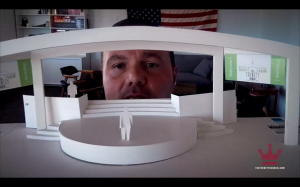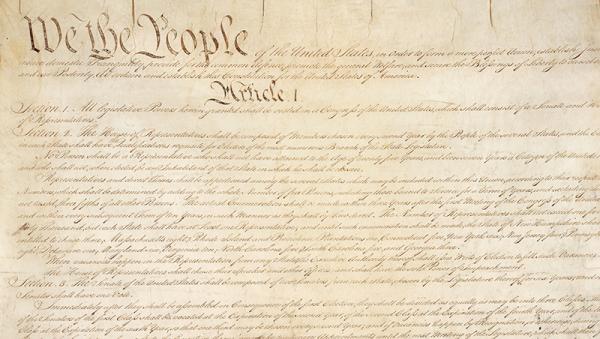During the summer of 2017, I did a daily series summarizing James Madison’s notes to the 1787 Constitutional Convention. Today, I am reprinting the final entry in that series in recognition of Constitution Day. On this day, after a change (tinkering to the end) in the document and a little dissent, the document was signed.
I read Madison’s notes looking for the Christian influence proposed by many Christian nationalists. While many of delegates were affiliated with Christian churches, I found very little interest on the part of the delegates to create a Christian republic.
……………………………………………….
(originally published September 17, 2017)
Today in 1787 the delegates to the Constitutional convention made one last minute change and then most signed the document.
Nathaniel Gorham from Massachusetts wanted to change the number of representatives by changing the ratio of one representative for every 30,000 instead of 40,000.
Mr. GORHAM said, if it was not too late, he could wish, for the purpose of lessening objections to the Constitution, that the clause, declaring that “the number of Representatives shall not exceed one for every forty thousand,” which had produced so much discussion, might be yet reconsidered, in order to strike out “forty thousand,” and insert “thirty thousand.” This would not, he remarked, establish that as an absolute rule, but only give Congress a greater latitude, which could not be thought unreasonable.
Mr. KING and Mr. CARROLL seconded and supported the ideas of Mr. GORHAM.
When the President rose, for the purpose of putting the question, he said, that although his situation had hitherto restrained him from offering his sentiments on questions depending in the House, and, it might be thought, ought now to impose silence on him, yet he could not forbear expressing his wish that the alteration proposed might take place. It was much to be desired that the objections to the plan recommended might be made as few as possible. The smallness of the proportion of Representatives had been considered, by many members of the Convention an insufficient security for the rights and interests of the people. He acknowledged that it had always appeared to himself among the exceptionable parts of the plan; and late as the present moment was for admitting amendments, he thought this of so much consequence, that it would give him much satisfaction to see it adopted.1
No opposition was made to the proposition of Mr. GORHAM, and it was agreed to unanimously.
Then the delegates voted with majorities of state delegations agreeing to the Constitution.
On the question to agree to the Constitution, enrolled, in order to be signed, it was agreed to, all the States answering, aye.
However, Edmund Randolph declared his intention not to sign.
Mr. RANDOLPH then rose, and with an allusion to the observations of Doctor FRANKLIN, apologized for his refusing to sign the Constitution, notwithstanding the vast majority and venerable names that would give sanction to its wisdom and its worth. He said, however, that he did not mean by this refusal to decide that he should oppose the Constitution without doors. He meant only to keep himself free to be governed by his duty, as it should be prescribed by his future judgment. He refused to sign, because he thought the object of the Convention would be frustrated by the alternative which it presented to the people. Nine States will fail to ratify the plan, and confusion must ensue. With such a view of the subject he ought not, he could not, by pledging himself to support the plan, restrain himself from taking such steps as might appear to him most consistent with the public good.
Elbridge Gerry also declared his intention not to sign.
Mr. GERRY described the painful feelings of his situation, and the embarrassments under which he rose to offer any further observations on the subject which had been finally decided. Whilst the plan was depending, he had treated it with all the freedom he thought it deserved. He now felt himself bound, as he was disposed, to treat it with the respect due to the act of the Convention. He hoped he should not violate that respect in declaring, on this occasion, his fears that a civil war may result from the present crisis of the United States. In Massachusetts, particularly, he saw the danger of this calamitous event. In that State there are two parties, one devoted to Democracy, the worst, he thought, of all political evils; the other as violent in the opposite extreme. From the collision of these in opposing and resisting the Constitution, confusion was greatly to be feared. He had thought it necessary, for this and other reasons, that the plan should have been proposed in a more mediating shape, in order to abate the heat and opposition of parties. As it had been passed by the Convention, he was persuaded it would have a contrary effect. He could not, therefore, by signing the Constitution, pledge himself to abide by it at all events. The proposed form made no difference with him. But if it were not otherwise apparent, the refusals to sign should never be known from him. Alluding to the remarks of Doctor FRANKLIN, he could not, he said, but view them as levelled at himself and the other gentlemen who meant not to sign.
Madison also records that George Mason didn’t sign the document.
The Constitution being signed by all the members, except Mr. RANDOLPH, Mr. MASON, and Mr. GERRY, who declined giving it the sanction of their names, the Convention dissolved itself by an adjournment sine die.
Madison showed his literary side by recording the following observation to end his notes.
Whilst the last members were signing, Doctor FRANKLIN, looking towards the President’s chair, at the back of which a rising sun happened to be painted, observed to a few members near him, that painters had found it difficult to distinguish in their art, a rising, from a setting sun. I have, said he, often and often, in the course of the session, and the vicissitudes of my hopes and fears as to its issue, looked at that behind the President, without being able to tell whether it was rising or setting: but now at length, I have the happiness to know, that it is a rising and not a setting sun.
1787 Constitutional Convention Series
To read my series examining the proceedings of the Constitution Convention, click here. In this series, I am writing about any obvious influences on the development of the Constitution which were mentioned by the delegates to the Convention. Specifically, I am testing David Barton’s claim that “every clause” of the Constitution is based on biblical principles. Thus far, I have found nothing supporting the claim. Today is the last day of the series since the work of the delegates was done and the Constitution sent on to the states for debate and ratification.
I have thoroughly enjoyed reading these notes and hope you have benefited as much as I have. To read all of the entries, if you have a few hours, click the following link:
Constitutional Convention Series (click the link)
To follow on social media, click the following links:
Facebook (blog posts and news)
Facebook (Getting Jefferson Right – history news)
Twitter
Like this article and want to see more like it? Support this blog at Patreon.com.
[email-subscribers namefield=”NO” desc=”Subscribe to receive notification of new posts.” group=”Public”]

